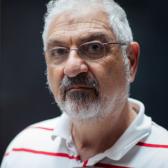
“Why Genocide? The Fate of the Armenians and Assyrians at the End of the Ottoman Empire”
Professional Background
Ronald Suny is Charles Tilly Collegiate Professor of Social and Political History, University of Michigan, Ann Arbor (USA) and Emeritus Professor of Political Science and History, University of Chicago (US). He was also the Director of the Eisenberg Institute for Historical Studies at the University of Michigan (2009-2012). He received his M.A. and PhD from Columbia University, New York, NY. He has language skills in English, Armenian, Russian, French, Turkish, Georgian, German, Latin, and Italian. While in residence at the Center, Dr. Suny worked on his project, entitled “Why Genocide? The Fate of the Armenians and Assyrians at the End of the Ottoman Empire.”
Dr. Suny is the author of many publications, including the books The Baku Commune, 1917-1918: Class and Nationality in the Russian Revolution (1972), Looking toward Ararat: The Armenians in Modern History (1993), The Making of the Georgian Nation (1994), The Soviet Experiment: Russia, the USSR, and its Successor States (2010), and most recently Stalin: From Koba to Commissar (currently at press). His recent lectures include “Young Stalin: The Making of a Revolutionary” at Ivan Javakhishvili Tbilisi State University in Tbilisi, Georgia, 2010; “Troubled Truths: Turks, Armenians, and the Pain of the Past” at Koc University in Istanbul, Turkey, 2011; and a symposium presentation on Wendy Z. Goldman’s Inventing the Enemy: Denunciation and Terror in Stalin’s Russia at Carnegie-Mellon University in Pittsburgh, PA, USA, 2012.
Fellowship Research
For his Everett and Marian Gordon Fellowship, Dr. Suny examined the political and social historical elements that created conditions for genocide against the Assyrian and Armenian subjects of Ottoman society. With this work, he hoped to answer the question of why the Turkish government opted for the most drastic solution to their perceived threat from these religious minorities, and why ordinary Turks and Kurds participated in such actions against their neighbors. Even further, he aimed to treat the Armenians as not only victims, but as actors in their own historic drama, as politicians, intellectuals, revolutionaries, and clerics, who in an age of nationalism developed a new view of themselves as a nation. Dr. Suny also created a factual basis for a new interpretation of 1915 and used this case to explore further the phenomenon of genocide in other contexts and historical periods.
Dr. Suny was in residence at the Mandel Center from July 1 to December 31, 2013.
